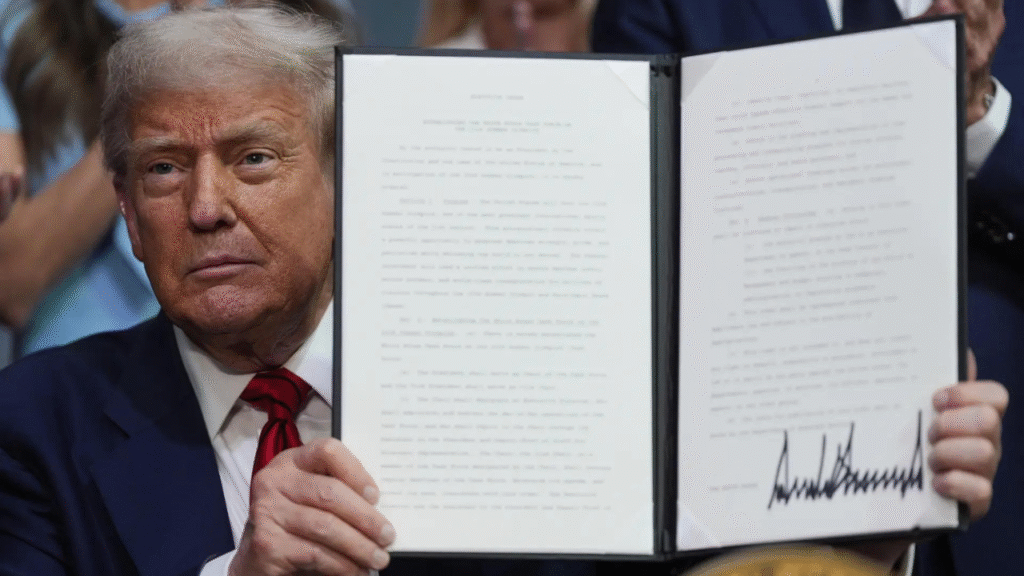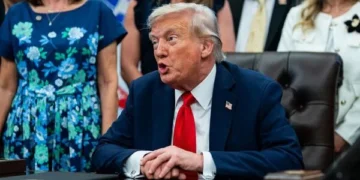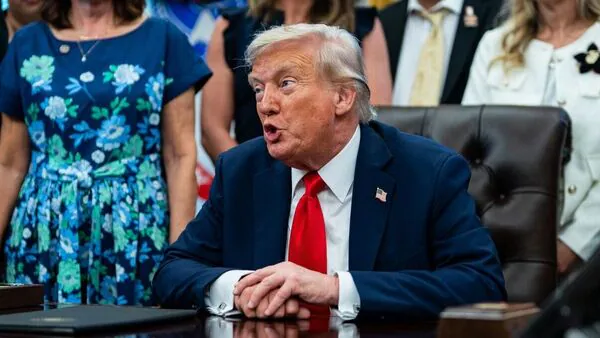U.S. President Donald Trump has issued a stern warning to nations imposing digital taxes, branding American tech firms as neither “piggy banks” nor “doormats,” and promising substantial additional tariffs and export restrictions unless such legislation is repealed.

Trump Declares: American Tech Firms Are Not “Piggy Banks” or “Doormats”; Tariff Threats Follow
U.S. President Donald Trump has intensified his long-standing battle over international digital taxation, asserting that American technology companies “are neither the ‘piggy bank’ nor the ‘doormat’ of the world.” In a forceful statement posted on his Truth Social platform, he warned that countries imposing digital services taxes or digital regulations on U.S. tech firms would face “substantial additional tariffs” on their exports to the United States, along with potential export controls on high-tech goods and semiconductors unless such measures are rescinded.
What Trump Is Saying — The Core Message
In his post, Trump accused foreign digital taxes and regulations—such as the EU’s Digital Services Act and similar national levies—of discriminating against American technology giants like Google, Apple, Meta, and Amazon. He argued such legislation “outrageously… give[s] a complete pass to China’s largest tech companies,” insisting the laws must be removed or else punitive measures will follow.
Specifically, he stated:
“With this TRUTH, I put all countries with Digital Taxes, Legislation, Rules, or Regulations, on notice… I will impose substantial additional Tariffs on that country’s exports to the U.S.A., and institute Export restrictions on our highly protected Technology and Chips.”
This message underscores Trump’s continued reliance on tariffs as a lever of economic and diplomatic pressure—a practice reemployed since his return to office in 2025.
Targeted Nations and Policy Implications
Although no specific countries were named in his pronouncement, the criticism clearly targets jurisdictions where digital taxes or strict tech regulations are in place—including many European nations, Canada, and potentially others such as South Korea.
Trump’s remarks arrive amid an escalating trade confrontation, including a revived February 2025 USTR investigation into Digital Services Taxes (DSTs), which have been imposed by countries like France, Italy, Spain, Turkey, and the UK. Earlier this year, Canada rescinded its DST following sustained pressure from the U.S..
Broader Trade Strategy and Possible Consequences
Beyond tariffs, the administration is reportedly considering sanctions targeting EU officials involved in implementing digital regulations like the Digital Services Act (DSA), adding layers to this unfolding dispute.
These measures dovetail with other aggressive trade actions in Trump’s second term—including sweeping tariff threats on metals, pharmaceuticals, and semiconductors—as part of a broader effort to reshape global trade norms and protect U.S. tech dominance.
Critics argue these threats risk destabilizing international trade agreements, such as those crafted under the OECD’s Inclusive Framework, and could provoke retaliation or legal challenges via the WTO or U.S. courts. Indeed, past executive tariff actions have faced judicial rebuke, with courts limiting presidential authority over emergency tariff powers.
Moving forward, several outcomes are possible:
- Diplomatic Negotiations: Governments may seek concessions or carveouts in return for rescinding digital taxes, aiming to avoid punitive U.S. tariffs.
- Escalation of Trade Tension: The issuance of export restrictions or targeted sanctions could deepen rifts, especially in transatlantic relations.
- Congressional or Judicial Barriers: Proposed legislation like the Trade Review Act of 2025 could curtail unilateral tariff decisions, while legal challenges could invalidate executive actions if deemed overreach.
- Global Tax Reform Delays: These threats may stall ongoing efforts to create equitable international digital taxation frameworks under the OECD system.
President Trump’s latest aggressive stance underscores a broader ideological battle over the global digital economy. By positioning American tech giants as enduring pillars of innovation and sovereignty, he is rallying against what he perceives as punitive taxation by foreign governments. Whether this strategy engenders concessions or deepens global friction, one thing is clear: the intersection of tech, taxation, and geopolitics is once again at center stage.
READ ALSO…….Petition Sees Over 2 Million Signatures Calling for Clemency for Indian Trucker After Florida Crash















 Categories
Categories









